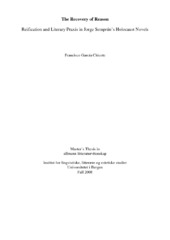The Recovery of Reason. Reification and literary praxis in Jorge Semprún's holocaust novels
Master thesis
Permanent lenke
https://hdl.handle.net/1956/7349Utgivelsesdato
2008-11-19Metadata
Vis full innførselSamlinger
Sammendrag
This thesis analyses literature's possibilities to give account of a highly reified event, the Holocaust. It examines three autobiographical novels of the Spanish-French writer Jorge Semprún: "Le grand voyage" (1963), "Quel beau dimanche!" (1980), and "L'écriture ou la vie" (1994). There are two ideas that ground the conditions for such an analysis. First, the thesis subscribes a Hegelian Marxist description of Capitalism and the Holocaust. Second, it displays a Lukacsian concept of art, arguing that literature is a realm of freedom and authentic praxis. From the analyses of the texts the thesis concludes that Semprún's novels give account of the specific subject-object relationship in Capitalism. The key concept that categorizes this relationship is "reification". However, only the last novel, "L'écriture ou la vie", manages to display an active stance that may simulate an authentic emergence of experience. This thesis analyses literature's possibilities to give account of a highly reified event, the Holocaust. It examines three autobiographical novels of the Spanish-French writer Jorge Semprún: "Le grand voyage" (1963), "Quel beau dimanche!" (1980), and "L'écriture ou la vie" (1994). There are two ideas that ground the conditions for such an analysis. First, the thesis subscribes a Hegelian Marxist description of Capitalism and the Holocaust. Second, it displays a Lukacsian concept of art, arguing that literature is a realm of freedom and authentic praxis. From the analyses of the texts the thesis concludes that Semprún's novels give account of the specific subject-object relationship in Capitalism. The key concept that categorizes this relationship is "reification". However, only the last novel, "L'écriture ou la vie", manages to display an active stance that may simulate an authentic emergence of experience.
